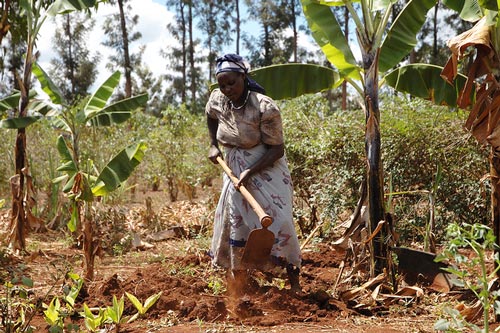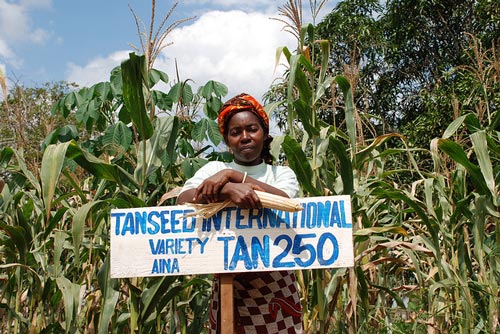The Drought Tolerant Maize for Africa (DTMA) project is an outgrowth of more than a decade of maize physiology research. It builds on more than 10 years of promoting the inclusion of selection for drought tolerance in maize breeding programs in Sub-Saharan Africa and the widespread development and regional testing of stress-tolerant varieties. DTMA is funded by the Bill & Melinda Gates Foundation with past support from the Howard G. Buffett Foundation, USAID, the UK Department for International Development (DFID), the Swiss Agency for Development and Cooperation (SDC), the German Federal Ministry for Economic Cooperation and Development (BMZ), the International Fund for Agricultural Development (IFAD) and the Eiselen Foundation. This blog post was originally published by CGIAR.
By Philippe Ellul/CGIAR

Currently, maize production supports the livelihoods of approximately 300 million people in sub-Saharan Africa (SSA). Climate change variability and the prevalence of extreme events, especially droughts, are a harsh reality for smallholder farmers in Africa who depend on rainfed agriculture. Maize production in Africa is almost completely rainfed and droughts plague approximately a quarter of the maize crop, resulting in losses as high as half the harvest. Extended periods of droughts therefore, adversely affect not only crop yields but also the livelihoods of African farmers. Economic analyses suggest that, if widely adopted, drought-tolerant maize seed can help African farmers cope with such impediments.
On a recent visit to the annual meeting of the Drought Tolerant Maize for Africa (DTMA) initiative held in Nairobi, I was privy to some evidence of research impact in this area, which I found to be quite significant. The Drought Tolerant Maize for Africa (DTMA) project (launched in 2006) seeks to mitigate drought and other barriers to production in the region.

Here are some highlights of key data on the measurable impacts of the DTMA project and a snapshot of some lessons learned during my time there. Not only will this information be useful for future partnerships but it can also be used to inform our processes during the 2nd call for proposals for the CGIAR Research Programs.
The DTMA project started in 2006. Here are the targets that the project has achieved thus far (in 2013) in terms of measurable impact:
◦140 new DTMA varieties released,
◦30,000 tons of seed (17,000 T from new varieties) produced last year in 13 African countries (Angola, Benin, Ethiopia, Ghana, Kenya, Malawi, Mali, Mozambique, Nigeria, Tanzania, Uganda, Zambia, and Zimbabwe)
◦An impact efficiency study (presented during the meeting) which indicated that several countries were able to reach their objectives in terms of seed production; Zimbabwe and Kenya were able to double their previous expected figures
◦ 110 African seed companies (72 small-national, 18 regional, 12 small and medium enterprises (SMEs), and 8 international enterprises) have adopted, produced and spread the new DTM varieties to local farmers,
◦ 1,230, 000 hectares planted with these new varieties, and
◦3 million households and 20 million people in total benefited and reached.
DTMA partners made certain that complete accountability was applied to the partnership network in order to ensure that the impact of research outcomes could be quantified. Thanks to this well-designed management model, researchers involved in the DTMA initiative were able to not only produce high quality research outputs but also ensure that research outcomes were adopted and scaled up. In addition, local facilities for Doubled Haploid (DH) production from tropical and sub-tropical maize germplasm have also been set up at the KARI (Kenyan Agriculture Research Institute) Kiboko Station.
Read the full post on CGIAR’s website here.
 Capacity development
Capacity development 
